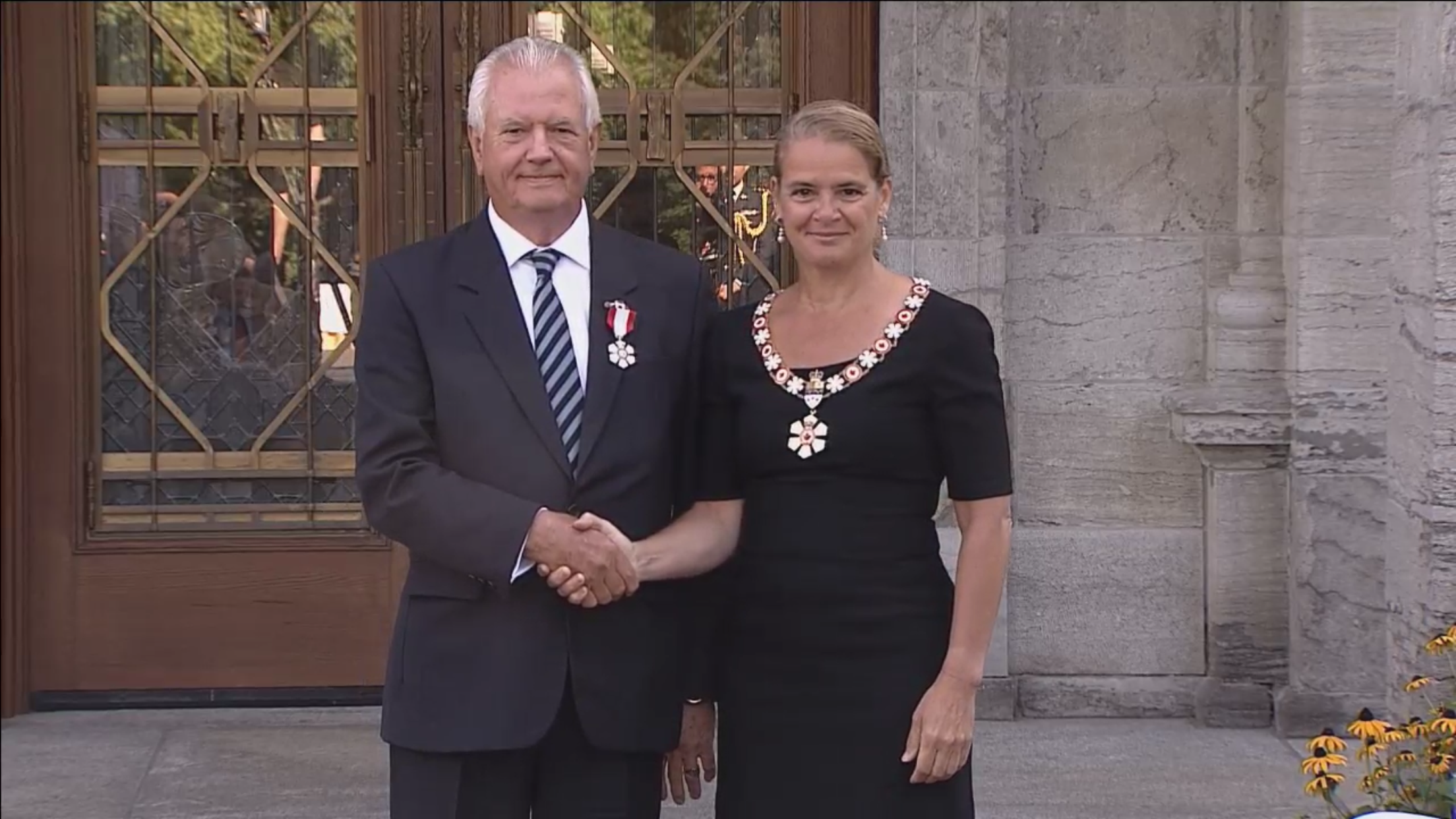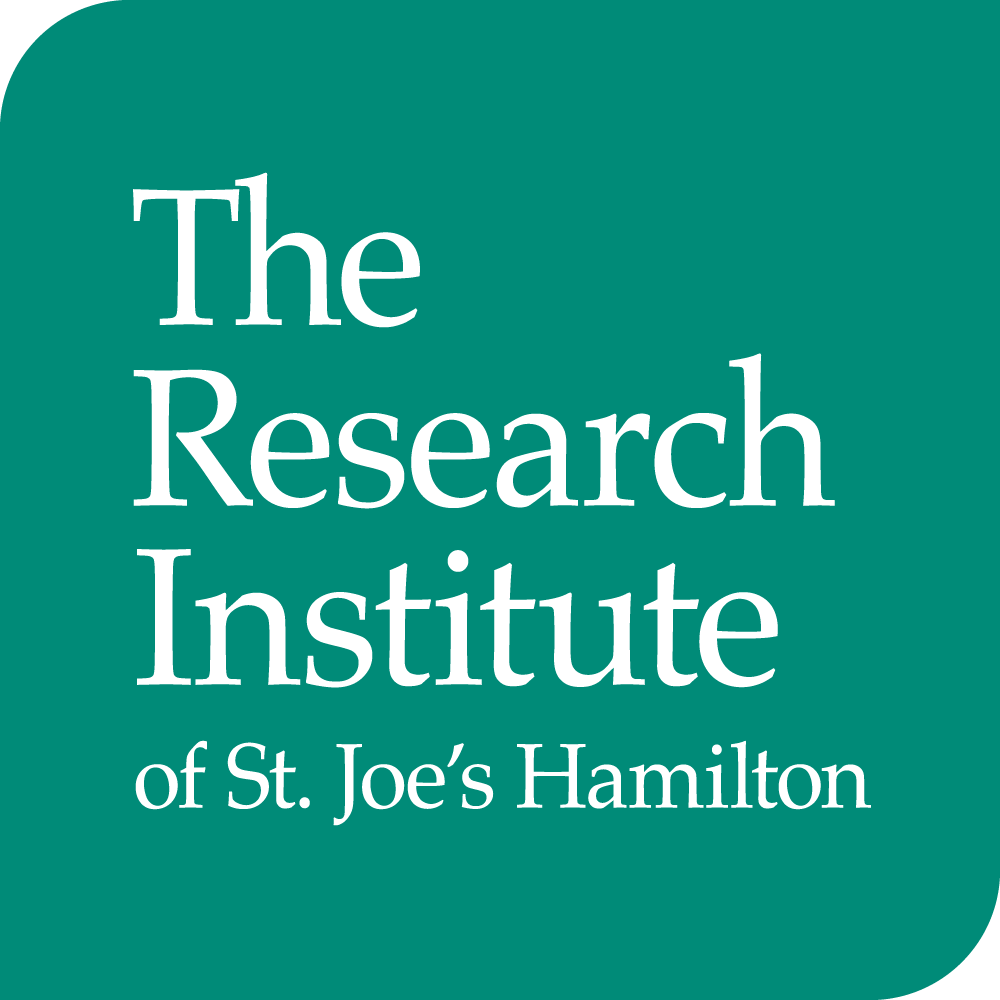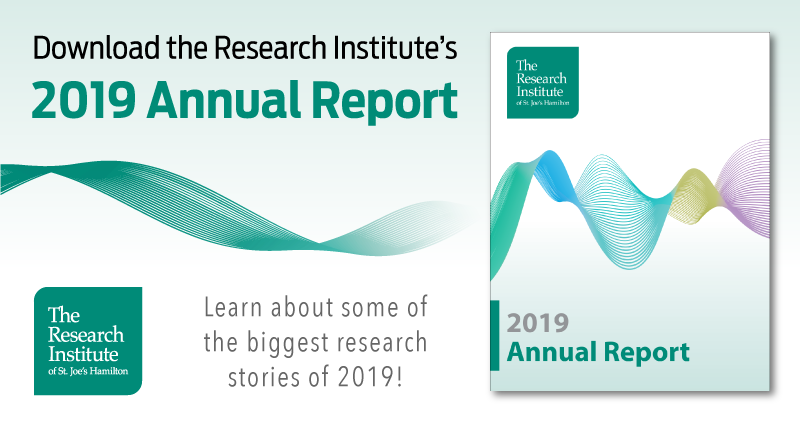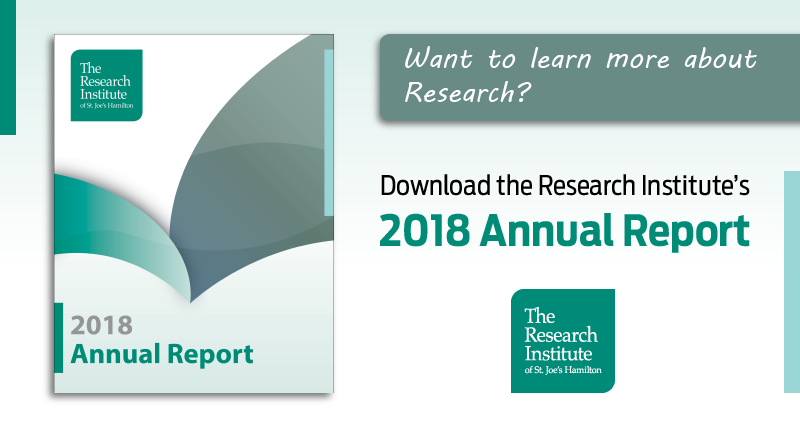The Research Institute of St. Joe’s Hamilton publishes an annual report to highlight how research at our hospital impacts the science of medicine and how it benefits the lives of patients in our community and around the world.
In our latest report reflecting on 2019, we examine exciting new international collaborations in neuroscience, drug advances in halting the progression of pulmonary fibrosis, St. Joe’s state-of-the-art Imaging Research Centre, novel basic science targeting hypertension and prostate cancer, and much more. The 2019 report also profiles St. Joe’s GUIDE Group, a team of physician-researchers who produce clinical practice guidelines based on the best evidence.
Download your copy of the 2019 Annual Report today!
World-Renowned Scientist, Water Polo Olympian, St. Joe’s Research Leader and Delta Secondary School Graduate Receives Canada’s Highest Honour
A brilliant scientist and a world-class athlete, Jack Gauldie could have taken his career to any locale around the globe. The renowned scientist chose to maintain his address in the city where he was raised, Hamilton, while the influence of his life’s work spanned the world.
St. Joseph’s Healthcare Hamilton Vice President (Research) and Delta Secondary School graduate has earned the country’s highest honour as a Member of the Order of Canada, which recognizes outstanding achievement, dedication to a community, and service to our nation.
The well-deserved recognition stems from achievements that have occurred over more than four decades pursuing two diverse passions, both resulting in Jack representing Canada on the world stage.

Some have called Dr. Gauldie one of the founding fathers of the field of cytokine biology. Cytokines are molecules that cells use to signal to each other. Indeed, one of Jack’s most significant contributions to health sciences was his discovery of Interleukin 6 (IL-6) and this cytokine’s role in understanding, at the molecular level, how people respond to infections, autoimmune diseases and chronic conditions, including cancer. His work with IL-6 evolved out of the most formative years of the newly discovered area of cytokine biology. Currently, drugs targeting IL-6 are being used in arthritis treatment.
In the mid-80s, Jack turned his attention to pulmonary fibrosis. His lab established that cytokines of the TGF-b family were major factors involved in the fibrotic process – the formation of scar tissue – in the lungs. The advancements spurred further interest and investigation of pulmonary fibrosis over the past 30 years, which led to the development of two new drug therapies for a lethal pulmonary disease.
Later, Jack began a close collaboration with Dr. Frank Graham at McMaster, a pioneer in the use of adenovirus as a vector for foreign genes. Jack worked with this vector system to deliver antigen genes to dendritic cells for cancer vaccine development. His work has helped the development of currently successful approaches to stimulate the human immune response to control cancer progression, and effect significant cancer regression.
After graduating from Delta Secondary School in Hamilton’s east end, Jack attended McMaster University to complete an undergraduate degree in chemistry and physics. His professors encouraged him to continue his graduate studies at University College London, England where he received his PhD in Biological Chemistry. He then returned to Hamilton to join the faculty at McMaster University’s Michael G. DeGroote School of Medicine, where he holds the highest honour of Distinguished University Professor.
“Dr. Gauldie, who is a long-time and respected colleague of mine, is a giant in the Faculty of Health Sciences. He is renowned for his extensive scientific investigation in the molecular manipulation for the treatment of diseases,” said Dr. Paul O’Byrne, Dean and Vice President, McMaster University Faculty of Health Sciences.
Dr. Gauldie has published over 370 scientific articles and a number of book chapters, mainly dealing with the areas of biomedical research. He has received awards from the Canadian Medical Association, the Canadian Society of Clinical Chemists, the Canadian Society for Immunology, and the Distinguished Achievement Award from the American Thoracic Society.
Dr. Jack Gauldie’s impressive achievements in medical research are made even more outstanding by the fact that his second passion led him to represent Canada in water polo at the Pan American Games in 1967, and again at the Munich Olympic Games in 1972.
“Prominent among Jack’s many qualities are his strong sense of commitment and loyalty. Jack is a staunch Hamiltonian dedicated to the promotion of the city, its university and this hospital,” said Dr. Stephen Collins, Distinguished Professor, Michael G. DeGroote School of Medicine. “As an internationally recognized scientist he has brought much recognition to our academic community. As an Olympic athlete, he served his country well. Few are more deserving of this recognition.”
Today, Dr. Gauldie is Vice President of Research at St. Joseph’s Healthcare Hamilton, and Scientific Director of its Research Institute. St. Joe’s is a McMaster University affiliated research hospital. In this role, Jack is a champion for healthcare research that is transforming clinical, translational, evaluative and fundamental research across the spectrum of mental health, kidney, genitourinary, and respiratory care. This work is also putting his beloved city of Hamilton on the map as a magnet for top medical researchers around the globe.
In praise of Jack Gauldie –
“Jack Gauldie’s induction into the Order of Canada reflects his multiple local, national and internationally acclaimed achievements. A former Canadian Olympic waterpolo athlete, he is globally recognized for his outstanding research in immunology, cancer and fibrosis, led McMaster’s Department of Pathology and Molecular Medicine to its current preeminence and now champions and leads health research at St Joseph’s Healthcare in Hamilton.”
– John Bienenstock,
Distinguished University Professor, McMaster University
“Upon hearing that Dr. Jack Gauldie was awarded the Order of Canada, two thoughts immediately came to mind. Fantastic!….but, what took so long! The Order of Canada recognizes Canadians for their contributions to culture or communication. Others for their significant contributions to sports or the arts. Still others for their contributions to science and the betterment of humanity. Jack Gauldie is all of the above. After representing Canada in the Olympics, he became a coach/manager and later an Olympic commentator on CBC. He took a bit of time off from these activities to become a world renowned scientist developing new treatments for cancer, and training the next several generations of Canadian scientists and physicians. Beyond all of these international accomplishments, those who know Jack best appreciate he is a wonderful person full of joy, kindness, laughter, and just the right amount of impish mischief to make us all smile.”
– John G. Kelton, MD,
Executive Director, Michael G. DeGroote Initiative for Innovation in Healthcare, Michael G. DeGroote School of Medicine, McMaster University
May 29, 2019
HAMILTON ON – Hamilton philanthropists Charles and Margaret Juravinski will create an endowment of more than $100 million to support researchers across Hamilton Health Sciences, McMaster University and St. Joseph’s Healthcare Hamilton.
Their estate gift is one of Canada’s largest ever legacy gifts and will provide up to $5 million a year to the institutions, in perpetuity.
“It brings us great pleasure to think that when we are gone, our legacy to this community may be measured in the good health of those who come after us,” the Juravinskis said in a letter to the community released today. “As a couple, our most important lesson has been this: the greatest pleasure in life and the most powerful force for good in the world is sharing.”
The endowment will create the Juravinski Research Centre, which will equally support Hamilton Health Sciences, McMaster University and St. Joseph’s Healthcare Hamilton by funding health research in a variety of areas including cancer, mental health, lung and respiratory care, and diseases of aging.
The Juravinskis, who have called Hamilton home for decades, are generous benefactors to health care, education and research in the city. They have given more than $50 million to Hamilton organizations, which includes support for the Juravinski Hospital and Cancer Centre at Hamilton Health Sciences, the Margaret & Charles Juravinski Education, Research & Development Centre at McMaster University and the Margaret & Charles Juravinski Centre for Integrated Healthcare and the Juravinski Innovation Tower at St. Joseph’s Healthcare Hamilton.
A Historic Hamilton Gift
“The health of generations of Canadians will be positively impacted by this wonderful legacy gift from Charles and Margaret Juravinski. In making this gift, they also helped inspire and enable our three organizations to collaboratively address some of the most important health issues of our time.” – Rob MacIsaac, President & CEO, Hamilton Health Sciences
“McMaster had already started talks with Hamilton Health Sciences and St. Joseph’s about how we could create new dimensions to our research partnerships to deliver even more to our community, when I received a call from Charlie Juravinski. He was very excited to explore how he and Margaret could leave a legacy that would improve the health
of people in Hamilton and around the world by supporting research. We will be eternally grateful for Charlie and Margaret’s vision and their confidence in our world class researchers’ ability to have deep and long-lasting impact in many critically important areas of health research.” – Dr. Paul O’Byrne, Dean and Vice-President, Faculty of Health Sciences, McMaster University
“Charles and Margaret Juravinski’s visionary gifts have forever changed health care in Hamilton and their legacy of giving will continue thanks to their investment in world-class research. By enabling collaborative research into mental health care, lung and respiratory health, oncology, and diseases of aging, the Juravinskis’ gift will impact not only patients and families in Hamilton, but countless others around the world for generations to come.” – Dr. Thomas Stewart, President & CEO, St. Joseph’s Health System
About the Juravinski Research Centre
- A research collaboration between Hamilton Health Sciences, McMaster University, St. Joseph’s Healthcare Hamilton, St. Joseph’s Healthcare Foundation, Hamilton and Hamilton Health Sciences Foundation
- The Centre will support areas of research including cancer, mental health, lung health/respirology and diseases of aging (e.g. Alzheimer’s disease and macular degeneration)
- Together, the partners will engage in collaborative, strategic projects that are focused on health-related research enhancing the health and prosperity of all of our citizens
- An eight-member Steering Committee will be responsible for setting all priorities and programs to be undertaken by the Juravinski Research Centr
Charles and Margaret Juravinski – A Legacy of Leadership
- Charles, 89, and Margaret, 87
- Charles (born in Blaine Lake, SASK) and Margaret Juravinski (born in Hamilton, ON) grew up knowing true poverty and hardship.
- Charles, born within days of the 1929 stock market crash, knew what it was like to live without work, money, heat and running water. His family moved to Hamilton when he was a child. His professional career evolved after he first worked at a construction company and then went on to own a series of businesses, which included a gas station and a development company.
- Charles and Margaret built and managed Flamboro Downs race track for 27 years, selling it in 2002 to Magna Entertainment.
Links to video
A video message from the Juravinkskis
A video message from Dr. Thomas Stewart, President & CEO of St. Joseph’s Health System
The Institutions
Hamilton Health Sciences
Hamilton Health Sciences (HHS) is the only hospital system in Ontario providing specialty care to people throughout the entire life cycle, from pre-birth to old age. HHS serves the densely populated south central region of Ontario and is also a referral centre for patients from elsewhere in the province.
With five hospitals (Hamilton General Hospital, Juravinski Hospital and Cancer Centre, McMaster Children’s Hospital, St. Peter’s Hospital and West Lincoln Memorial Hospital) and six specialized healthcare facilities, HHS has the largest hospital-based workforce in Ontario: 15,000 staff, physicians and volunteers.
In addition to providing excellent patient care, Hamilton Health Sciences’ mission includes advancing health care through education and research. In affiliation with McMaster University and other educational institutions, HHS is helping to train the next generation of caregivers. It has also become an international leader in hospital-based research and is recognized as one of the top four healthcare research institutions in Canada. More than 2,000 investigators and research staff at HHS work together to attract $170 million in research funding annually.
Hamilton Health Sciences Foundation
Hamilton Health Sciences Foundation provides vital funding to enable the best possible patient care. We inspire and motivate gifts that fund medical equipment and patient amenities, innovative research initiatives, essential redevelopment of clinical care spaces, and the education and training of health care providers. As a registered charitable organization, we proudly support patients and families across south-central Ontario, and from outside the region, who receive specialized care at Hamilton Health Sciences including Hamilton General Hospital, Juravinski Hospital and Cancer Centre, McMaster Children’s Hospital, and St. Peter’s Hospital. The associated programs at the Regional Rehabilitation Centre, McMaster University Medical Centre and Ron Joyce Children’s Health Centre are also included.
McMaster University
McMaster University is Canada’s most research-intensive university and is consistently ranked as one of the world’s Top 100 universities. Together, our researchers, students and staff advance human and societal health and well being, creating a Brighter World.
St. Joseph’s Healthcare Hamilton
St. Joseph’s Healthcare Hamilton (SJHH) is a leading research and academic health science centre located in the heart of Hamilton, Ontario. It is a pioneer of the Integrated Comprehensive Care model, a leader in patient-centred care, and a major provider of mental health and addiction services, respiratory care and kidney care, in addition to other acute care, surgical and outpatient services at its three distinct sites. SJHH is a member of the St. Joseph’s Health System, working in close partnership with St. Joseph’s Villa Dundas for long-term care, and St. Joseph’s Home Care.
St. Joseph’s Healthcare Foundation
Since 1970, St. Joseph’s Healthcare Foundation has been proud to partner with the community to raise funds in support of the exceptional patient care, innovative research and education, and vital facility and equipment needs at St. Joseph’s Healthcare Hamilton.
In 2012, St. Joseph’s Healthcare Foundation became one of a selected group of charities across Canada to be accredited by Imagine Canada’s Standards Program. The program recognizes excellence in Canadian charities in five areas, including: board governance, financial accountability & transparency, fundraising practices, staff management, and volunteer involvement.
Publication: Council of Academic Hospitals of Ontario | May 9, 2019
Rheumatoid arthritis (RA) is an auto-immune disease that affects approximately 1 in 100 Canadians. RA is caused by a malfunction of the body’s own immune system. The disease is characterized by joint inflammation that causes pain, stiffness, and swelling. Joint degradation occurs as a result of the immune system’s attack on the lining of the joints.
Early signs of RA can be vague, such as feeling tired and unwell, accompanied by sore joints. As the disease progresses, more joints may become affected. Detecting RA in its early stages is a major factor in the successful treatment of the disease. The window to achieve remission, thereby preventing permanent damage to the joints, is an estimated 6-12 months, and this narrow timeframe presents a challenge.
Dr. Maggie Larché is a clinician-researcher at St. Joseph’s Healthcare Hamilton. For years, Dr. Larché has been at the forefront of advancing the use of ultrasound in the diagnosis and treatment of RA. Dr. Larché also teaches musculoskeletal ultrasonography to medical trainees and clinicians in an effort to expand use of this diagnostic technique.
Research on the feasibility of ultrasound for RA diagnosis conducted by Dr. Larché and her colleagues is transforming the field of rheumatology in Canada. Though the technique may require longer clinical visits for patients at the point of care, its ability to enhance early detection and monitoring will help more Canadians start treatment sooner and avoid permanent damage to their joints. Not only does this reduce the health care resources needed to treat chronic RA, it assists in improving patient quality of life.
“We know that ultrasound can detect RA sooner than clinical methods, and an earlier diagnosis can have a significant impact on a patient’s recovery and overall quality of life,” explains Dr. Larché. “My colleagues and I have promoted the use of ultrasound in diagnosing and monitoring patients with RA, as well as increased the use to ultrasound training for health care providers in Canada.”
Overall, there are many advantages of using ultrasound over other imaging methods. Ultrasound is a non-invasive, radiation-free, portable, and inexpensive tool for diagnosing RA. In addition, diagnosis occurs in real-time with the patient, unlike an MRI or CT scan.
“I was diagnosed with RA in my hands. The treatment for RA involves injections to reduce the inflammation that causes pain. Her use of ultrasound to pinpoint the problematic spots of my hands allows her to find the best place for each injection, improving the effectiveness of the treatment. Dr. Larché has given me the use of my hands, which has greatly improved my quality of life,” said Margaret Clark, patient and research participant.
St. Joseph’s Healthcare Hamilton is one of Ontario’s 23 research hospitals that contribute to a healthier, wealthier, smarter province. Look for other RESEARCH SPOTLIGHT posts on our Healthier, Wealthier, Smarter blog or join the conversation about why health research matters for Ontario on Twitter, using the hashtag #onHWS.
Each year, the Research Institute of St. Joe’s – Hamilton publishes an annual report to highlight how research at our hospital impacts the science of medicine and the lives of patients around the world.
This year’s report explores regional and international collaborations, state-of-the-art treatments, new ways of thinking about cardiovascular disease, the vision of the urological oncology research centre, and even the science of research design. Download your copy today to learn about the exciting advancements made throughout 2018.
Two Hamilton researchers will study post traumatic stress in emergency services
Media Outlet: Hamilton Spectator | Date: February 14, 2019 | Reporter: Joanna Frketich
Hamilton researchers are teaming up with scientists in France to determine the links between mind and body that could one day bring about more personalized mental health treatments.
“The hope for the patients one day is that when they come with depression, we don’t give them only an anti-depressant,” said Dr. Flávio Kapczinski, professor of psychiatry at McMaster University and St. Joseph’s Healthcare.
“We give them a whole strategy on how they would get outside the risk zone for depression.
“We could give them exercise, correct their metabolism with some sort of diet and give them anti-inflammatories.”
The partnership with the Pasteur Institute was one of three new Hamilton mental health projects launched in February.
The other two will investigate post-traumatic stress injuries (PTSI) in public safety personal such as firefighters, paramedics, police officers and correctional workers.
Both received grants of up to $150,000 from the Canadian Institutes of Health Research as part of $2.95 million in federal funding announced Feb. 8 to studies that increase understanding of how to identify, treat and prevent PTSI.
Margaret McKinnon, chair in mental health and trauma at McMaster, will do a randomized control trial to test a new way to treat PTSI in public safety personal with other health conditions.
Occupational therapist Sandra Moll plans to design a mobile health approach to prevention and peer support.
“Public safety personnel put themselves in harm’s way to protect Canadians, putting them disproportionately at risk of post-traumatic stress injuries,” federal minister of public safety and emergency preparedness Ralph Goodale said in a statement.
“Our country must do more to protect the mental well-being of public safety officers on-the-job. The initiatives will help address gaps in PTSI research and inform long-term plans to support the mental health and well-being of our public safety personnel.”
Meanwhile, the new partnership with the French researchers is significant because it gives St. Joseph’s Healthcare and McMaster access to basic science research that they don’t have now.
In turn, they offer Pasteur large cohorts of patients from West 5th hospital that the French are currently missing.
“We are accumulating a lot of data in this field now and thanks to this collaboration we’re going to have access to large cohorts,” head of Pasteur’s perception and memory unit Dr. Pierre-Marie Lledo said during a trip to Hamilton on Feb 7.
“We get a full picture of how the brain functions by having access to the clinical data.”
It’s also unique because French researchers generally team up with Quebec investigators.
“When France would partner with Canada they never crossed the Gatineau River,” said Kapczinski.
“Now the commitment of the French Embassy is to bring to the attention of French scientists this whole perspective of dealing with many other centres like McMaster. We are looking to the idea of strengthening the scientific links between Canada and France.”
So far, funding is primarily from their own institutions and the French Embassy, but they are working on applying for grants to study many different potential mind and body links.
“We were finding our patients when they have depression, they have a lot of inflammation in their blood,” said Kapczinski.
“We didn’t know the cause of that. Pasteur is famous because it’s where immunology and inflammation started to be understood … so we reached out to the director and he was very excited.”
Other questions vary from gut bacteria to exercise to metabolism to electric signalling between fatty tissues of the brain.
“People who suffer from depression they suffer a lot of brain changes like accelerated aging,” said Kapczinski.
“The brain and the body as a whole starts to age faster and we want to understand the mechanisms associated with that.”



